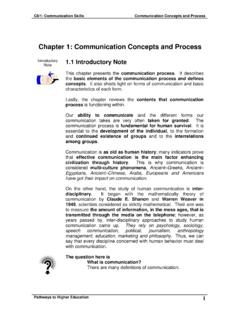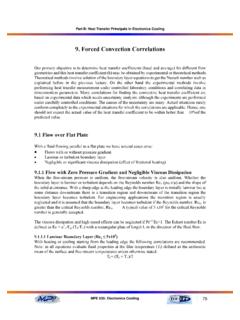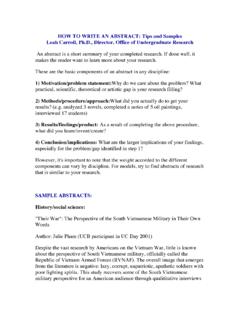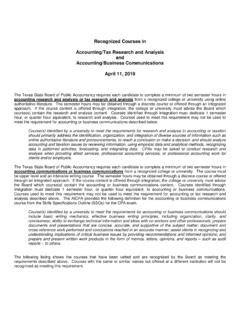Transcription of C3-1 Research Methods and Writing Research Proposals
1 Pathways to Higher Education Project Center for Advancement of Postgraduate Studies and Research in Engineering Sciences, Faculty of Engineering - Cairo University (CAPSCU). Research Methods and Writing Research Proposals Prof. Dr. Samy Tayie Research Methods and Writing Research Proposals by Prof. Dr. Samy Tayie Professor, Faculty of Mass Communication, Cairo University Cairo 2005. Research Methods and Writing Research Proposals First Published 2005. Published by Center for Advancement of Postgraduate Studies and Research in Engineering Sciences, Faculty of Engineering - Cairo University (CAPSCU). Tel: (+202) 5716620, (+202) 5678216. Fax: (+202) 5703620. Web-site: E-mail: Deposit No. 10079/2005. ISBN 977-403-013-3. All Rights reserved. No part of this publication may be reproduced, stored in a retrieval system, or transmitted in any form or by any means; electronic, mechanical, photocopying, recording, or otherwise, without the prior written permission of the publisher.
2 Acknowledgment On behalf of Pathways to Higher Education Management Team in Egypt, the Project Coordinator wishes to extend his thanks and appreciation to the Ford Foundation (FF). for its full support to reform higher education, postgraduate studies and Research activities in Egypt. The Management Team extend their special thanks and appreciation to Dr. Bassma Kodmani, Senior Project Officer at the Ford Foundation office in Cairo, who helped initiate this endeavor, and who spared no effort to support the Egyptian overall reform activities, particularly Research and quality assurance of the higher education system. Her efforts were culminated by the endorsement to fund our proposal to establish the Egyptian Pathways to Higher Education project by the Ford Foundation Headquarters in New York.
3 The role of our main partner, the Future Generation Foundation (FGF), during the initial phase of implementation of the Pathways to Higher Education Project is also acknowledged. The elaborate system of training they used in offering their Basic Business Skills Acquisition (BBSA) program was inspiring in developing the advanced training program under Pathways umbrella. This partnership with an NGO. reflected a truly successful model of coordination between CAPSCU and FGF, and its continuity is mandatory in support of our young graduates interested in pursuing Research activities and/or finding better job opportunities. The contribution of our partner, The National Council for Women (NCW), is appreciated. It is worth mentioning that the percentage of females graduated from Pathways programs has exceeded 50%, which is in line with FF and NCW general objectives.
4 The second phase of the project will witness a much more forceful contribution from the NCW, particularly when implementing the program on the governorates level as proposed by CAPSCU in a second phase of the program. We also appreciate the efforts and collaborative attitude of all colleagues from Cairo University, particularly the Faculties of Commerce, Art, Mass Communication, Law, Economics and Political Sciences, and Engineering who contributed to the success of this project. Finally, thanks and appreciation are also extended to every member of the Center for Advancement of Postgraduate Studies and Research in Engineering Sciences (CAPSCU), Steering Committee members, trainers, supervisors and lecturers who were carefully selected to oversee the successful implementation of this project, as well as to all those who are contributing towards the accomplishment of the project objectives.
5 Pathways Steering Committee Members SN Member Name Title Institution 1 Dr. Ahmed Aboulwafa Professor and Chief of the Department of CU. Mohamed Public International Law, Faculty of Law and Ex-Vice Dean for Postgraduate Studies, Faculty of Law 2 Dr. Ahmed Farghally Professor of Accounting and Dean of the CU. Faculty of Commerce 3 Dr. Ali Abdel Rahman President of Cairo University CU. 4 Dr. Bassma Kodmani Senior Program Officer, Governance and FF. International Cooperation, Ford Foundation, Cairo Office 5 Dr. Fouad Khalaf Ex-Project Manager, Project Consultant CU. and Local Coordinator of TEMPUS Risk Project 6 Dr. Hoda Rashad Professor and Director of Social Research NCW. Center, American University in Cairo (AUC). 7 Dr. Kamel Ali Omran Professor of Human Resources and CU. Organizational Behavior, Business Administration and Ex-Vice Dean for Postgraduate Studies, Faculty of Commerce 8 Dr.
6 Mahmoud Fahmy Professor of Social Science and Ex-Vice CU. El Kourdy Dean for Students Affairs, Faculty of Arts 9 Mr. Moataz El-Alfy Vice Chairman of Future Generation FGF. Foundation 10 Mr. Mohamed Farouk Secretary General and Board Member, FGF. Hafeez Future Generation Foundation 11 Dr. Mohamed K. Bedewy Dean of the Faculty of Engineering and CAPSCU. Chairman of CAPSCU Board 12 Dr. Mohamed M. Megahed Director of CAPSCU CAPSCU. 13 Dr. Mohsen Elmahdy Said Project Coordinator CU. 14 Dr. Salwa Shaarawy Gomaa Professor of Public Policy and Ex-Director NCW. of Public Administration Research & & CU. Consultation Center (PARC), Faculty of Economics Political Sciences 15 Dr. Sami El Sherif Vice Dean for Students Affairs, Faculty of CU. Mass Communication 16 Dr. Sayed Kaseb Project Manager CU.
7 17 Dr. Zeinab Mahmoud Selim Professor of Statistics and Ex-Vice Dean CU. for Students Affairs, Faculty of Economics and Political Sciences CU Cairo University NCW National Council for Women FF Ford Foundation FGF Future Generation Foundation CAPSCU Center for Advancement of Postgraduate Studies and Research in Engineering Sciences, Faculty of Engineering - Cairo University Publisher Introduction The Faculty of Engineering, Cairo University is a pioneer in the field of learning and continual education and training. The Center for Advancement of Postgraduate Studies and Research in Engineering Sciences, Faculty of Engineering - Cairo University (CAPSCU) is one of the pillars of the scientific Research centers in the Faculty of Engineering. CAPSCU was established in 1974 in cooperation with UNIDO and UNESCO organizations of the United Nations.
8 Since 1984, CAPSCU has been operating as a self-financed independent business unit within the overall goals of Cairo University strategy to render its services toward development of society and environment. CAPSCU provides consultation services for public and private sectors and governmental organizations. The center offers consultation on contractual basis in all engineering disciplines. The expertise of the Faculty professors who represent the pool of consultants to CAPSCU, is supported by the laboratories, computational facilities, library and internet services to assist in conducting technical studies, Research and development work, industrial Research , continuous education, on-the-job training, feasibility studies, assessment of technical and financial projects, etc. Pathways to Higher Education (PHE) Project is an international grant that was contracted between Cairo University and Ford Foundation (FF).
9 During ten years, FF. plans to invest 280 million dollars to develop human resources in a number of developing countries across the world. In Egypt, the project aims at enhancing university graduates' skills. PHE project is managed by CAPSCU according to the agreement signed in September 22nd, 2002 between Cairo University and Ford Foundation, grant No. 1020 - 1920. The partners of the project are Future Generation Foundation (FGF), National Council for Women (NCW) and Faculties of Humanities and Social Sciences at Cairo University. A steering committee that includes representatives of these organizations has been formed. Its main tasks are to steer the project, develop project policies and supervise the implementation process. Following the steps of CAPSCU to spread science and knowledge in order to participate in society development, this training material is published to enrich the Egyptian libraries.
10 The material composes of 20 subjects especially prepared and developed for PHE programs. Dr. Mohammad M. Megahed CAPSCU Director April 2005. Foreword by the Project Management Pathways to Higher Education, Egypt (PHE) aims at training fresh university graduates in order to enhance their Research skills to upgrade their chances in winning national and international postgraduate scholarships as well as obtaining better job. Pathways steering committee defined the basic skills needed to bridge the gap between capabilities of fresh university graduates and requirements of society and scientific Research . These skills are: mental, communication, personal and social, and managerial and team work, in addition to complementary knowledge. Consequently, specialized professors were assigned to prepare and deliver training material aiming at developing the previous skills through three main training programs: 1.











